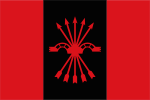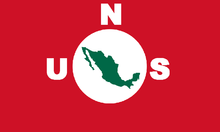- National Synarchist Union
-
Part of a series on Falangism  Core tenetsTopicsIdeasWorksLists· List of Falangist movementsRelated topics
Core tenetsTopicsIdeasWorksLists· List of Falangist movementsRelated topicsPolitics portal v · Spanish: Unión Nacional Sinarquista) is a Mexican political organization. It was historically a movement of the Roman Catholic extreme right, in some ways akin to clerical fascism and falangism, violently opposed to the leftist and secularist policies of the revolutionary (PNR, PRM, and PRI) governments that ruled Mexico from 1929 to 2000. Contents
Formation
The UNS was founded in May 1937 by a group of Catholic political activists led by José Antonio Urquiza, who was murdered in April 1938. The group published the "Sinarquista Manifesto,"[1] opposing the policies of the government of President Lázaro Cárdenas. "It is absolutely necessary that an organization composed of true patriots exists," the Manifesto declared, "an organization which works for the restoration of the fundamental rights of each citizen and the salvation of the Motherland. As opposed to the utopians who dream of a society without governors and laws, Synarchism supports a society governed by a legitimate authority, emanating from the free democratic activity of the people, that truly guarantees the social order within all find true happiness." The group's date of formation, 23rd May, was celebrated annually in León, Guanajuato by the membership.[2]
The UNS was led by Salvador Abascal, a hard-liner, from 1940 to 1941 when he stood down in order to set up a synarchist commune in Baja California with the more moderate Manuel Torres Bueno becoming leader.[3]
Ideology
The ideology of the UNS derived from the current of Catholic social thinking of the 1920s and 1930s, based on the papal encyclical Rerum Novarum of Pope Leo XIII, which also influenced the regimes of Engelbert Dollfuss in Austria, Antonio Salazar in Portugal and Francisco Franco in Spain. It stressed social co-operation as opposed to the class conflict of socialism, and hierarchy and respect for authority as opposed to liberalism. In the context of Mexican politics, this meant opposition to the centralist, semi-socialist and anti-clerical policies of the PRI regime. As a result, UNS members were denounced as fascists and persecuted by the Cárdenas government and the group had little real impact in Mexican politics.
The question of synarchism became an issue for U.S. Intelligence analysts during World War II. In a now declassified U.S. report dated April 22, 1942, Raleigh A. Gibson, First Secretary of the U.S. Embassy in Mexico, sent the U.S. Secretary of State an English translation of an editorial from El Popular, the newspaper of the Confederation of Mexican Workers, published on April 21, 1942. It reads in part as follows:
- "The French sinarquistas rushed into furious strife against French and European democracy; those of Mexico organized to combat Mexican and continental democracy. The French sinarquistas were adopted by Abetz, the Ambassador of Hitler in France; the Mexican sinarquistas were recruited, were given a name, were educated and directed by Nazi agents in Mexico and by Falange directors who are working illegally among us. And this is so apparent, so conclusive, that it eliminates the need of concrete proofs of the organic connection between them. The fundamental proof is that sinarquism is not a unique and exclusive Mexican product, as its leaders untruthfully argue. That Sinarquism, even bearing the identical name, does exist in other parts of the world and is an international movement formed by those who are under the supreme orders of Hitler."[citation needed]
Mexican author Mario Gill argues that the synarchist movement in Mexico was essentially co-opted by right-wing Catholic elements in the U.S., led by Cardinal Francis Spellman and Bishop Fulton Sheen. This assessment was echoed by El Popular, which in its December 14, 1943 issue wrote as follows:
- "There is no doubt that the recent visit to Mexico of Msgr. Sheen, the pro-fascist 'black leader' of North American clericalism, contributed towards obtaining the conversion of the Mexican Synarchists to a new policy in tune with the demands of the situation of the new world."[citation needed]
Decline and revival
The UNS was firmly pro-Axis powers during World War II and its propaganda increased in this direction following the increase in anti-American feeling engendered in Mexico by the Sleepy Lagoon murder.[4] President Manuel Ávila Camacho placed a ban on the UNS holding public meetings in June 1944 at a time when factionalism was dividing the movement.[5] The movement split in two in 1945 when Carlos Athie replaced Torres Bueno as leader, resulting in the deposed leader's breaking away to start their own group (with both claiming the UNS name).[6]
In 1946 the Torres Bueno faction regrouped as the Popular Force Party (Partido Fuerza Popular). In 1951, however, when it was clear that the more moderate National Action Party (PAN) had become the main party of opposition to the PRI government, the Synarchist leader Juan Ignacio Padilla converted the movement to an "apolitical" one promoting conservative Catholic social doctrine, promoted through co-operatives, credit unions and Catholic trade unions.
Synarchism, which had become largely localised to Guanajuato, revived as a political movement in the 1970s through the Mexican Democratic Party (PDM), whose candidate, Ignacio González Gollaz, polled 1.8 percent of the vote at the 1982 presidential election.[7] In 1988, Gumersindo Magaña polled a similar proportion, but the party then suffered a split, and in 1992 lost its registration as a political party. It was dissolved in 1996. The Torres Beuno-Athie split was never ended and to date there are two organisations, both calling themselves the Unión Nacional Sinarquista.[6] One has an apparently right-wing orientation[8], the other is apparently left-wing[9], but they both have the same philosophical roots.
References
- ^ Manifiesto Sinarquista (1937)
- ^ Daniel Newcomer, Reconciling modernity: urban state formation in 1940s León, Mexico, U of Nebraska Press, 2004, p. 117
- ^ Philip Rees, Biographical Dictionary of the Extreme Right Since 1890, 1990
- ^ Kevin Starr, Embattled Dreams: California in War and Peace, 1940-1950, p. 103
- ^ Robert Jackson Alexander, Latin American Political Parties, Praeger, 1973, p. 438
- ^ a b LA UNIÓN NACIONAL SINARQUISTA DE MÉXICO: El Sinarquismo en el período de la posguerra
- ^ A. Riding, Mexico: Inside the Volcano, Coronet Books, 1989, p. 113
- ^ National Synarchist Union (Website of the right-wing UNS, in Spanish)
- ^ National Synarchist Unionista (Website of the competing left-wing UNS, in Spanish) (Not available Jul 26, 2008)
External links
- National Synarchist Union blog (Website in Spanish)
Categories:- National Political Associations in Mexico
- National syndicalism
- Falangism
Wikimedia Foundation. 2010.
Look at other dictionaries:
National Political Association — In the context of Mexican politics, a national political association (Spanish: Agrupación política nacional, APN) is a citizens association intended to assist in the development of democratic life and the country s political culture, as well as… … Wikipedia
National Will Organization (Mexico) — The National Will Organization ( es. Organización por la Voluntad Nacional) is a far right Mexican nationalist organization, opposing American culture influences, abortion, gay marriage, and the presence of Evangelical and Protestant religions in … Wikipedia
National Will Organization — The National Will Organization (Spanish: Organización por la Voluntad Nacional), is a far right Mexican nationalist organization, opposing Anglo American culture influences [1], abortion, gay marriage, and the presence of Evangelical and… … Wikipedia
Synarchism — (from Greek words meaning to rule together or harmonious rule ) is a word that has been used to describe several different political processes in various contexts. Political theoryJoint ruleThe earliest recorded use of the term synarchy is… … Wikipedia
Falangism in Latin America — Part of a series on Falangism … Wikipedia
Mother's Day — This article is about several worldwide days celebrating motherhood. For other uses, see Mother s Day (disambiguation). Mother s Day A homemade greeting card, one of many ways to honor one s mother Observed by Many countries … Wikipedia
List of political parties in Mexico — This article lists political parties in Mexico.Mexico has a multi party system, which means that there are more than two dominant political parties. Nationally, there are three large political parties that dominate: the PRI, the PAN, and the PRD … Wikipedia
Mexican Democratic Party — The Mexican Democratic Party (Partido Demócrata Mexicano PDM in Spanish) was an ultra Catholic social conservative political party in Mexico that existed between 1979 and 1997. Contents 1 Origins 2 Electoral performance 3 Decline … Wikipedia
Manuel Torres Bueno — was a Mexican politician and jefe (leader) of the National Synarchist Union. He was aged 30 in 1943.[1] A lawyer by profession, Torres Bueno abandoned his practice in December 1941 to take over as leader of the Union from Salvador Abascal, who… … Wikipedia
Social Alliance Party — The Social Alliance Party (Spanish: Partido Alianza Social ) was a political party in Mexico. The PAS was defined to itself as a humanist party and rejected to be fit in in the traditional spectrum of right, center or left, nevertheless was… … Wikipedia
Share the article and excerpts
Direct link
https://en-academic.com/dic.nsf/enwiki/3459902 Do a right-click on the link above
and select “Copy Link”
National Synarchist Union
- National Synarchist Union
-
Part of a series on Falangism  Core tenetsTopicsIdeasWorksLists· List of Falangist movementsRelated topics
Core tenetsTopicsIdeasWorksLists· List of Falangist movementsRelated topicsPolitics portal

